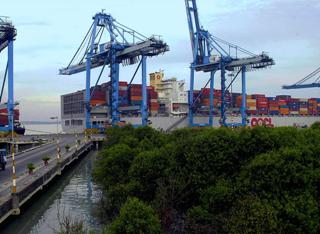 The United States and Malaysia have entered into a customs mutual assistance agreement (CMAA) to enhance collaboration on security and trade facilitation between the two countries.
The United States and Malaysia have entered into a customs mutual assistance agreement (CMAA) to enhance collaboration on security and trade facilitation between the two countries.
U.S. Department of Homeland Security Assistant Secretary Alan Bersin signed the agreement for the U.S. and Deputy Finance Minister Datuk Ahmad Maslan for Malaysia, according to a report by Bernama, Malaysia’s national news agency.
“Customs Mutual Assistance Agreements are valuable tools in law enforcement as they facilitate information sharing with international partners. This agreement will improve coordination in combating illicit cross-border activities and will enable both countries to better prevent, detect and investigate Customs offenses,” said Bersin in a statement.
The signing is seen to boost further U.S.-Malaysia relationship and increase the level of bilateral engagement and cooperation between the two economies.
The agreement covers a broad range of issues, including trade and investment, education, security and defense, and the environment. It comes after the comprehensive partnership agreement signed by Malaysian Prime Minister Datuk Seri Najib Tun Razak and U.S. President Barack Obama this year.
CMAAs are bilateral agreements between countries that are enforced by their respective Customs administrations. They provide the legal framework for the exchange of information and cooperation. They help countries prevent, detect, and investigate customs offenses and crimes associated with goods crossing international borders, including duty evasion, trafficking, proliferation, money laundering, and terrorism-related activities.
Look East Policy targets stronger ties with Korea
Meanwhile, Malaysia’s Minister of International Trade and Industry Datuk Seri Mustapa Mohamed said the second wave of the country’s Look East Policy (LEP 2.0) will give special focus to economic cooperation with South Korea.
He said emphasis will be on developing strategic sectors such as automotive, small and medium enterprise development, trade, and applied research and development to leverage on each other’s trade and investment environment ecosystems.
“To drive implementation of LEP 2.0, both Malaysian and South Korean governments will leverage on the existing cooperative channels on bilateral industrial cooperation in automotive, electrical and electronics/information and communications technology, plant, and trade and investment to explore new areas of collaborations,” he told the Malaysian media recently.
Malaysians have over the past three decades benefited from the Look East Policy with South Korea, particularly in training and education in the fields of science and technology. The skills, knowledge, and experience acquired by Malaysians sent to South Korea in turn have enriched the Malaysian economy, and now the second wave of the policy is more economic-oriented.
Nevertheless, LEP 2.0 will continue building on the existing human capital development programs such as youth exchange programs and scholarships, Mustapa said.
South Korea was Malaysia’s seventh largest trading partner in 2013. For the past 10 years, average annual growth rate of trade between Malaysia and South Korea was 8.07%.
Mustapa said total trade with South Korea in 2013 increased 13.6% to US$18.03 billion (RM56.85 billion) from $16.2 billion in 2012. From January to October this year, trade increased 7.9% to $15.41 billion.
South Korean companies continue to be among the major investors in Malaysia, and in 2013 were the second largest investors with approved investments amounting to $1.67 billion in 13 manufacturing projects.
From January to September this year, South Korea remained among the top 10 foreign investors with approved investments amounting to $472 million in electronics and electrical products, basic metal products, plastic products, and wood and wood products.
Photo: Hafiz343




